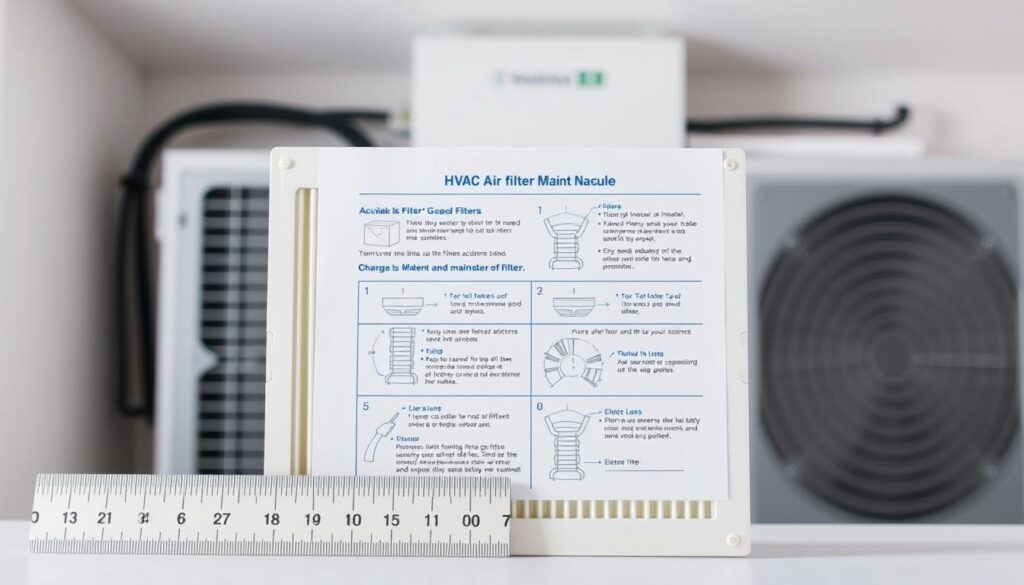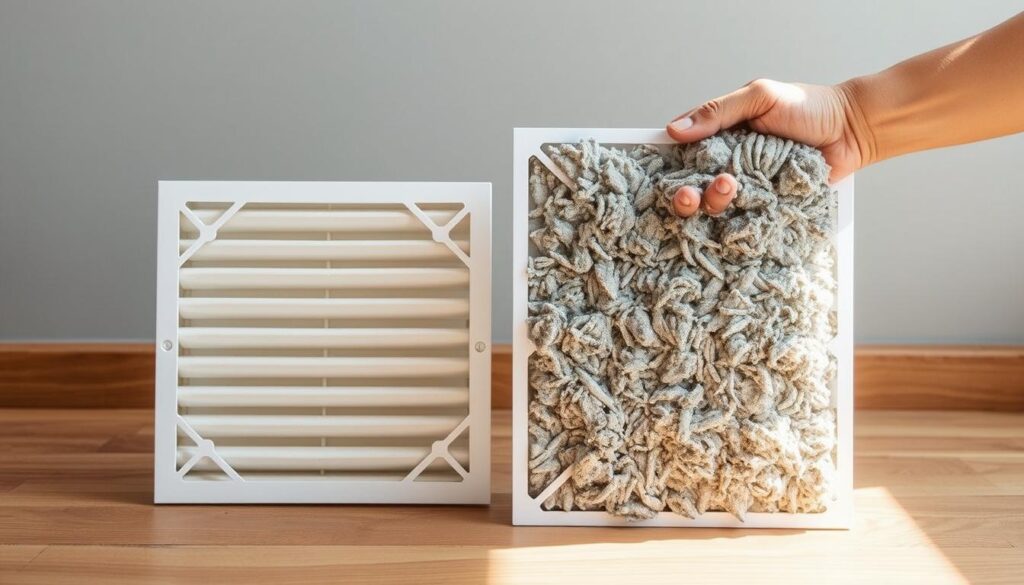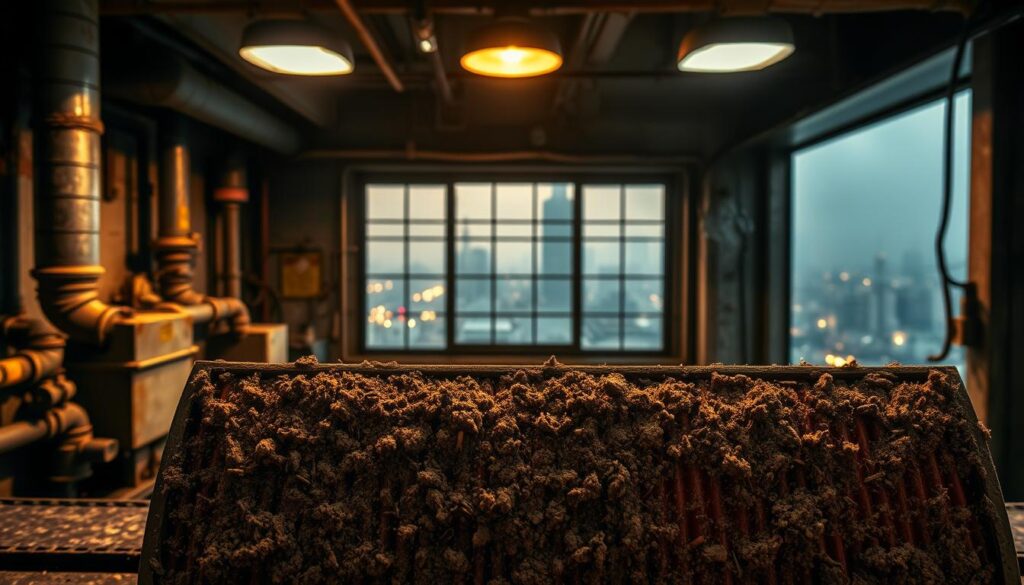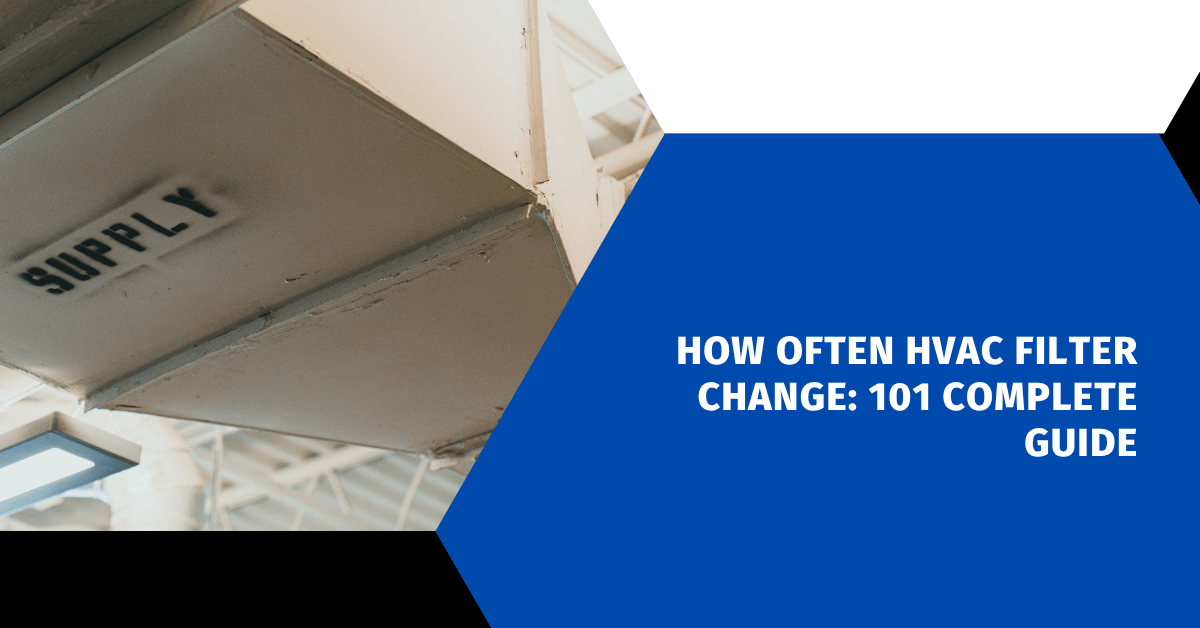Affiliate Disclosure
HVAC Guide Guys is a participant in the Amazon Services LLC Associates Program, an affiliate advertising program designed to provide a means for sites to earn advertising fees by advertising and linking to Amazon.
How Often HVAC Filter Change? Did you know that your home’s air quality could be silently compromising your health and HVAC system performance? Understanding how often HVAC filter change should occur is more critical than most homeowners realize.

HVAC filter replacement frequency is a key part of home maintenance. It directly affects your indoor environment and system efficiency. Dust, allergens, and pollutants build up fast, making regular filter changes vital for clean, healthy air.
This guide will cover everything you need to know about HVAC filter maintenance. You’ll learn how to determine the right replacement schedule and understand what affects filter longevity. You’ll get expert tips to keep your home’s air quality at its best.
Key Takeaways
- Regular HVAC filter changes protect your health and system performance
- Filter replacement frequency varies based on multiple environmental factors
- Different filter types require unique maintenance schedules
- Clean filters can significantly improve indoor air quality
- Neglecting filter maintenance can lead to increased energy costs
Table of Contents
Understanding HVAC Filter Basics and Their Importance
Your HVAC system’s filter is key to keeping your air clean and your energy use down. These filters work hard to keep your home’s air and your heating and cooling system safe from bad particles.
Filters are your home’s first defense against bad air. They catch dust, pollen, pet dander, and more. This helps keep your air quality and HVAC system running well.
Types of HVAC Filters Available
There are many air filter options:
- Fiberglass filters: Budget-friendly but less effective
- Pleated filters: More efficient and longer-lasting
- High-efficiency particulate air (HEPA) filters: Top-tier protection
- Washable filters: Reusable but need regular cleaning
Role in Indoor Air Quality
Clean filters are key for healthy indoor air. They catch tiny particles that can cause allergies and breathing problems. A clean filter keeps your home’s air fresh and clean.
“A clean filter is like a guardian for your home’s air quality” – HVAC Professionals
Impact on System Performance
Your HVAC system’s energy use depends on the filter’s condition. A dirty filter makes your system work harder, using more energy and risking damage. Replacing filters regularly keeps your system running well and saves energy costs.
Knowing about filters helps you make smart choices for your home’s air. It keeps you and your HVAC system healthy and safe.
Explore Our HVAC Shop
Looking for top-rated HVAC tools, parts, and accessories? Visit our shop and find the perfect solution for your needs.
Visit the ShopFactors Affecting Filter Replacement Frequency
Your hvac filter needs to be replaced based on several important factors. These factors affect your home’s air quality and how well your HVAC system works. Knowing these helps keep your air clean and protects your heating and cooling equipment.
Here are the main things to think about when deciding when to change your air filter:
- Filter Type: Different filters last for different lengths of time
- Home Environment: The air inside your home is key
- Household Composition: Pets and family size affect filter use
- System Usage: How often you use your heating and cooling matters
Some homes need filters changed more often. For example, if you have pets, live in a dusty area, or have family members with breathing problems. You’ll need to change filters more often to keep the air clean.
The age and upkeep of your HVAC system also play a role. Older systems or those not well-maintained might need filters changed more often. This helps keep the air flowing well and prevents mechanical problems.
Pro tip: Keep track of when you replace filters and watch how your system performs. This will help you find the best maintenance plan for your home.
Think about making a filter replacement calendar that fits your home’s needs. This way, you can keep the air in your home clean and make your HVAC system last longer.
How Often HVAC Filter Change: Standard Guidelines
Keeping your HVAC system’s air filter clean is key for good air and system performance. Knowing when to change your air filter can save you money and keep your home comfy.
Fiberglass Filter Replacement Schedule
Fiberglass filters are the simplest type of HVAC filter. They are thin and disposable, needing to be replaced often. You should swap out fiberglass filters every 30 days to keep air quality and system efficiency up.
- Recommended change interval: 30 days
- Best for basic home environments
- Most affordable filter option
Pleated Filter Maintenance Timeline
Pleated filters filter better than fiberglass ones. For pleated filters, most people replace them every 60-90 days.
- Standard pleated filters: 90-day replacement
- High-quality pleated filters: Up to 6 months
- Dependent on home conditions
High-End Filter Longevity
Premium HVAC filters offer better protection and last longer. Some top filters, like the Lennox Healthy Climate CarbonClean 16, can last up to 12 months with regular care.
Your air filter change schedule might change based on:
- Home occupancy
- Pet presence
- Local air quality
- System usage
Pro tip: Always check your filter monthly, regardless of its expected lifespan.
Explore Our HVAC Shop
Looking for top-rated HVAC tools, parts, and accessories? Visit our shop and find the perfect solution for your needs.
Visit the ShopImpact of Home Size and System Usage
Your home’s size and how much you use your HVAC system are key to knowing when to replace filters. Bigger homes need more complex systems to manage airflow. This affects how often you need to change filters.
Different home sizes face unique challenges in keeping energy use down. Here are important factors that affect how often you should change filters:
- Square footage of living space
- Number of rooms and levels
- Ceiling height
- Total air circulation volume
Homes with more square footage tend to have filters fill up faster. This is because more air moves around, picking up dust, allergens, and other particles.
| Home Size Category | Average Filter Replacement Frequency | Energy Efficiency Impact |
|---|---|---|
| Small (under 1,000 sq ft) | Every 3-4 months | Low strain on HVAC system |
| Medium (1,000-2,500 sq ft) | Every 2-3 months | Moderate system load |
| Large (over 2,500 sq ft) | Every 1-2 months | Higher chance of losing efficiency |
How much you use your HVAC system also matters. Homes that run their systems all the time or have big temperature swings need filters changed more often. This keeps your HVAC system running well and saves energy.
Pro tip: Keep an eye on your filter’s condition, no matter your home size. This ensures your HVAC system works at its best.
Signs Your HVAC Filter Needs Immediate Replacement
Keeping your indoor air clean is key. Spotting dirty air filter signs early can stop system damage and keep your air clean.
Your HVAC system sends out important signals. Knowing these signs helps you keep your system running well and air quality high.
Visual Inspection Techniques
Spotting a dirty filter is easy. Here are simple ways to check:
- Hold the filter up to a light source
- Check for significant color changes
- Observe dust accumulation
Performance Warning Indicators
Several signs show your filter needs a change:
- Reduced airflow from vents
- Unexplained increase in energy bills
- Uneven heating or cooling
- Unusual system noises
Indoor Air Quality Red Flags
Poor air quality often comes from dirty filters. Look out for these signs:
- Increased dust around vents
- Persistent allergy symptoms
- Musty or stale air odors
- Visible dust particles floating
Pro tip: Regular filter checks can stop breathing problems and keep your HVAC running smoothly.
Seasonal Considerations for Filter Changes

How often you need to change your HVAC filter changes with the seasons. Knowing these changes helps keep your air clean and your system running well all year.
In summer and winter, your AC and heating work extra hard. This means you’ll need to change filters more often. Usually, you should check your HVAC filters every 30-60 days during these busy times.
- Summer: High AC usage requires more frequent filter changes
- Winter: Constant heating increases filter dirt accumulation
- Spring/Fall: Milder seasons allow extended filter life
Seasonal factors that affect how often you need to change your HVAC filter include:
| Season | Filter Change Frequency | System Stress Level |
|---|---|---|
| Summer | Every 30-45 days | High |
| Winter | Every 30-45 days | High |
| Spring | Every 60-90 days | Low |
| Fall | Every 60-90 days | Low |
Pro tip: Always check your filter every month, no matter the season. If it looks dirty or air flow is weak, it’s time for a new one, even if it’s not time yet.
Explore Our HVAC Shop
Looking for top-rated HVAC tools, parts, and accessories? Visit our shop and find the perfect solution for your needs.
Visit the ShopSpecial Circumstances Requiring More Frequent Changes
Your HVAC filter needs to be changed more often in certain situations. This is to keep the air inside your home clean and your system running well.
Pets and Fur Challenges
Living with pets can make it harder to keep your HVAC filter clean. Pets shed hair, dander, and tiny particles that block filters. Here’s what pet owners should do:
- Dogs and cats: Replace filters every 60-90 days
- Multiple pets or heavy shedding breeds: Consider monthly replacements
- Use high-efficiency filters designed for pet households
Respiratory Health Considerations
People with allergies or breathing problems need cleaner air. They should change their filters more often:
- Allergy sufferers: Replace filters every 20-45 days
- Asthma patients: Use HEPA-rated filters
- Monitor filter condition more closely
Construction and Renovation Impact
Home renovations create a lot of dust and debris. Your HVAC system works harder to clean the air during these times. Here’s how to keep it running smoothly:
- Replace filters every 30 days during renovations
- Use temporary higher-efficiency filters
- Clean surrounding areas to reduce dust accumulation
Keeping up with filter changes is key to a clean, efficient HVAC system, no matter your home situation.
Impact of Location and Environmental Factors

Your home’s location is key in figuring out how often to replace your HVAC filters. Different places face different air quality issues. This affects how well your HVAC system works.
Local environmental factors can change how often you need to swap out your filters. Some areas need more frequent changes because of their unique air conditions.
- Urban environments with high pollution levels
- Regions experiencing frequent dust storms
- Areas with high pollen counts
- Locations near industrial zones
Knowing your local environment helps keep your air inside clean and your HVAC running smoothly. Places with special air quality needs need specific filter change plans.
| Location Type | Filter Replacement Frequency | Air Quality Impact |
|---|---|---|
| Urban Areas | Every 1-2 months | High pollution exposure |
| Desert Regions | Every 1-3 months | Significant dust accumulation |
| Coastal Zones | Every 2-3 months | Salt and moisture challenges |
| Rural Areas | Every 3-4 months | Lower pollution levels |
Pro tip: Think about your local environment when planning your HVAC filter maintenance. Your location can greatly affect how well your filters work and your indoor air quality.
Explore Our HVAC Shop
Looking for top-rated HVAC tools, parts, and accessories? Visit our shop and find the perfect solution for your needs.
Visit the ShopProper Filter Maintenance and Replacement Techniques
Keeping your HVAC system’s air filter clean is key for good performance and air quality. A regular maintenance schedule protects your system and keeps the air in your home healthy.
HVAC technicians stress the need for regular filter care. Knowing the right steps can make your system last longer and work better.
Step-by-Step Replacement Guide
Replacing your HVAC filter is easy but needs attention:
- Turn off your HVAC system completely
- Locate the filter compartment
- Remove the old filter carefully
- Check the airflow direction arrows on the new filter
- Insert the new filter with arrows pointing in the correct direction
- Ensure a snug and secure fit
- Close the filter panel
- Restart your HVAC system
Common Installation Mistakes to Avoid
- Incorrect filter orientation – Always match airflow direction arrows
- Using the wrong filter size
- Forgetting to turn off the system before replacement
- Failing to clean the filter compartment
Disposal Best Practices
It’s important to dispose of used filters correctly. Seal them in a plastic bag to stop dust from spreading. Look up local rules for how to dispose of them properly.
Pro Tip: Mark your calendar or set a reminder to check your filter monthly and replace it as needed to maintain optimal HVAC performance.
Conclusion
Knowing when to change your HVAC filter is key for good air and energy use at home. There’s no one-size-fits-all rule. Your home’s needs, how you live, and your HVAC system decide the best time to change filters.
Keeping your HVAC in top shape is more than just changing filters. Think about your home’s special features, like pets or air quality. Regular checks and timely changes keep your system running smoothly and air clean.
Investing in regular filter care boosts your system’s performance and saves energy. It also makes your air healthier. No matter the size of your home, knowing your HVAC’s needs keeps it efficient and comfortable for years.
The best plan is to be flexible and watch your system closely. Check your filter often and change it when needed. Your HVAC will thank you with better performance and cleaner air.

